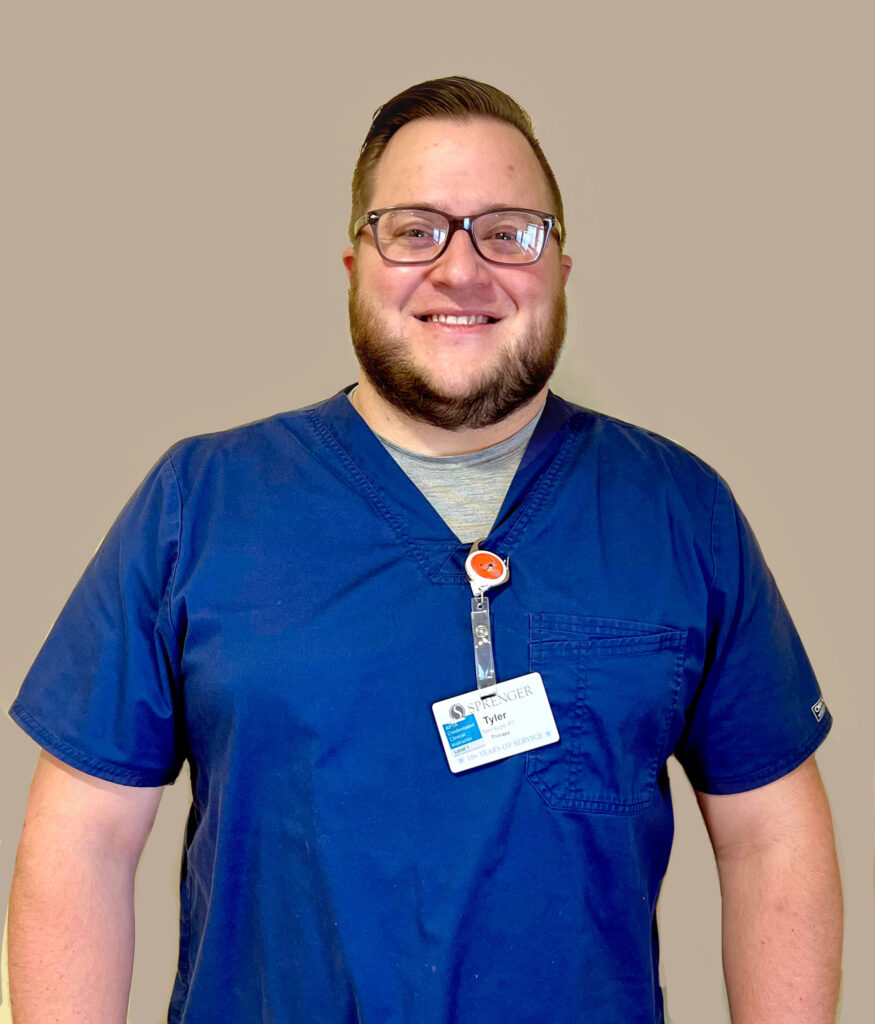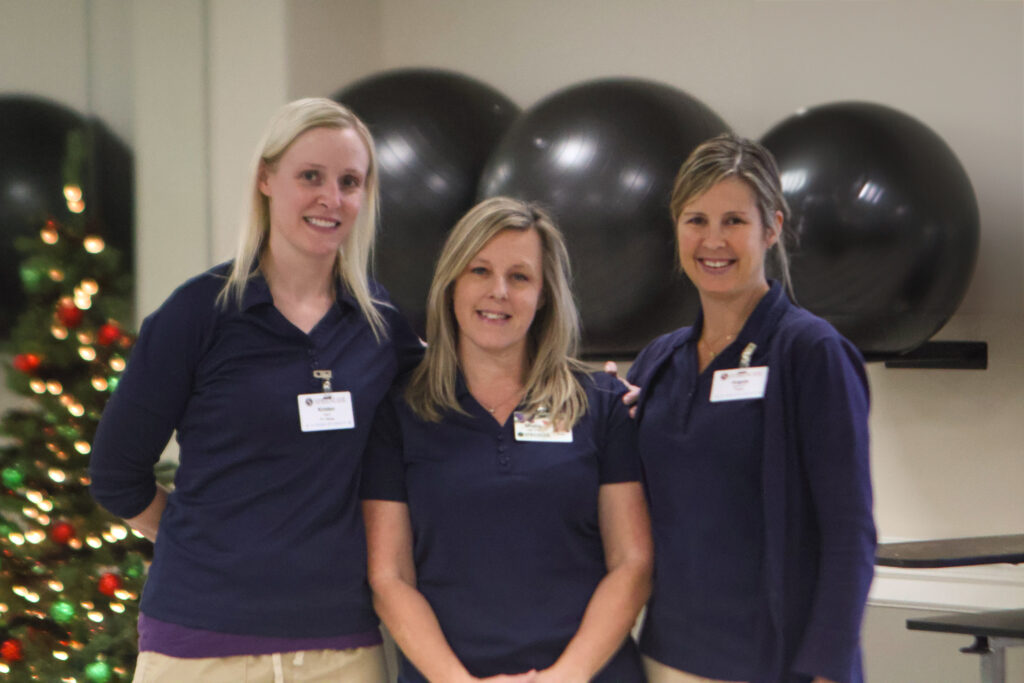In November, Tyler Sponaugle, a Physical Therapist from Sprenger Health Care Rose Lane hosted two company-wide, free CEU programs specializing in vestibular rehabilitation, in which dozens of Sprenger’s therapists attended. Tyler began his therapy career with Sprenger Health Care over 10 years ago, and has recently obtained a specialization in vestibular rehabilitation, in which he aims to continue assisting the community and other therapists gain knowledge on the topic through outreach and CEUs. These CEUs were held at Towne Center in Avon Lake, Ohio, and Heather Knoll Nursing and Rehabilitation in Tallmadge, Ohio, to provide accessibility to the therapists commuting from the other surrounding Sprenger facilities.

Many of the therapists in attendance had worked within Sprenger Health Care Systems for a decade or more, which had the group thinking – how many years of combined experience have they all had while employed with Sprenger?
The answer spans more than 200 years of therapy experience within the South Sprenger Health Care facilities alone, in total resulting in 363 years from all Sprenger Health Care Systems, and even more in overall clinical experience!
Many of the therapists in the photo above began their careers with Sprenger and overtime have grown throughout the company, building on learned, hands-on experience and one-on-one mentoring.
This is the case with Angie Maurer, OTR/L. In 2009 she was in her final year of graduate school at Cleveland State University, when she attended an Occupational Therapy conference and had the opportunity to chat with leadership from Sprenger Health Care Towne Center. Here, she learned that the only years-old, newly constructed nursing facility was in Avon Lake, Ohio, Angie’s hometown. She, along with a handful of her classmates, were given the opportunity to begin their career with Sprenger Health Care, all of which remain employed with the company!
Angie has been an Occupational Therapist with Sprenger Health Care since the very beginning of her career, working at Towne Center for nearly 15 years. Angie stated, “I love working here, at Towne Center. The people are amazing; We all work together, bouncing ideas off one another. Physical, occupational, and speech therapists work as one unit, making sure that our residents get the best care that we can provide. Everyone here is just amazing – the nurses, the environmental staff, everyone!”
For Mistie Hall, PTA, she has had a similar experience to Angie. Mistie went to Lorain County Community College and received a degree in Applied Science, continuing on to become a certified Physical Therapy Assistant, which is a career that she has worked in for nearly 20 years. She began her career in a neighboring hospital, and then transitioned into a travel position, which is how she happened across Sprenger Health Care. She began working for Sprenger Health Care Systems almost 17 years ago, at Autumn Aegis in Lorain, Ohio. For her first few years with Sprenger, she traveled around to other local Sprenger facilities, such as Anchor Lodge, Amherst Manor, and Elms Retirement Village, but 12 years ago, she decided to make a permanent home at Towne Center, where she has been ever since.
In December 2023, Mistie took over an exercise class held twice a week in Towne Center’s Independent Living, assisting residents with physical activities to continually improve their health and independence. The class has exponentially grown since Mistie has taken over, and it is just one small piece of her time at Sprenger that she values dearly. Mistie’s end-career goal is to eventually retire with Sprenger.
Kristen Matus, PT, DPT, has been with Sprenger Health Care for exactly half of her career, nearing a decade. She graduated from Toledo University in the Fall of 2006 and began working as a Physical Therapist in January of 2007. In 2016, some of Kristen’s friends persuaded her to try out a new avenue with Sprenger, and so she did. Out of her 18-year long Physical Therapy career, Kristen has spent 9 of those years with Sprenger Health Care, and she doesn’t plan to leave anytime soon. In fact, Kristen hopes to continue her growth at Towne Center by promoting continued positive development with the outpatient therapy caseload. She stated that her goal is to “help the community by providing care.”
Flourishing Careers

Angie, Mistie, and Kristen are just a few of the many therapists who have chosen Sprenger Health Care as a place to flourish their career. Not only has their career grown over time, but the relationships they have garnered have given them family-like friendships in both co-workers and residents. Angie stated that the one part of her job that she enjoys the most is being able to go to work and enjoy her time spent with all of the residents, but especially the residents who reside in long-term care, who she has known and worked with for years.
Sprenger Health Care Systems is an ever growing 12-nursing home, 10-assisted living, and 8-independent living enterprise, employing more than 2,000 professionals, located in Ohio and South Carolina. If you are interested in joining Angie, Mistie, Kristen, and the dozens of other devoted therapy professionals, search our open positions here.
Reducing the Holiday Blues in Nursing FacilitiesAs the holiday season quickly approaches, garland and tinsel temporarily adorning most homes, you may feel more cheerful than you have all year. We often gather with family and friends, eating, chatting, reminiscing of the past, and what our future entails. Spreading love, kindness, and cheer by giving gifts or making holiday cookies. However, there are some, specifically older adults, that have a more difficult time getting into the holiday spirit.
For many seniors, the holiday season may have a new meaning. Instead of setting out cookies and milk for Santa, or traveling to long-distance relative’s homes, the absence of these traditions may leave the holiday season seeming like a thing of the past.
Some factors that may contribute to holiday depression among the elderly include:
- Absence of parents, siblings, friends, and children (feeling alone)
- Separation from loved ones
- Financial limitations
- Loss of independence
- Loss of mobility
- Failing eyesight (lessening the ability to read/write holiday correspondence)
- Medical diagnosis
These changes may result in feeling subdued or sad, which is a normal reaction to facing change and generally temporary, the person eventually returning to their normal mood state, but a case of long-term blues is not a natural part of aging. When these feelings begin interfering with functioning in everyday life, it is considered depression.
Doug Gregory, the Bereavement Coordinator for Sprenger Health Care’s WellSpring Hospice says, “The American Association of Geriatrics Psychiatry, (AAGP) indicates that over 30% of nursing home residents may experience depression which can be exasperated during the holidays due to several factors. Caregivers and facility staff should be aware of changes in behavior and mood with residents.”
Some signs of depression in older individuals may include:
- Questioning the value of life
- Diminished self-esteem
- Excessive feelings of guilt
- Reduced appetite
- Lethargy/lack of energy
- Persistent sadness
- Withdrawal from social activities
- Unusual fidgeting
- Staring off into space (or at the television) for prolonged periods of time
Depression is a medical illness that should be diagnosed and treated by trained professionals. Left untreated, depression may last months or even years.
Gregory also offered a handful of tips in dealing with seasonal depression, saying, “Some preventative measures to consider are: referrals for counseling and psychiatry, bringing in service animals, children’s choirs, and other special activities during high-risk seasons, collecting old holiday cards and decorations to hang on resident’s doors and in their rooms, encouraging family members to purchase scenic window film coverings for the resident’s room, and simply taking time to just sit or talk with these residents. It is essential to differentiate between normal sadness and clinical depression, which requires treatment. If you or someone you know is struggling, professional support can make a significant difference.”
Other things that may help a person with a case of the holiday blues:
- Find ways to include elderly family members/friends in holiday preparation.
- Help with specific tasks.
- Help wrap holiday gifts
- Create crafts to decorate with or give as a gift
- Create or have them walk you through a favorite holiday recipe
- Help fill out and send holiday cards
- If you can’t visit, call.
- Stay busy.
- Facility activities and events
- Make new traditions.
Depression may go past just during the holiday season. Seasonal Affective Disorder (SAD) is a type of depression that comes and goes with the seasons, typically starting in the late fall and early winter and goes away during the spring and summer. A sad mood is linked to lack of sunlight during the winter months due to shorter days.
It is important to note that depressive and suicidal thoughts or actions should never be ignored. If you or a loved one is experiencing any of these symptoms, please take action by calling your doctor, 911, visiting the nearest emergency room, or contacting nursing or therapy staff.
Call the toll-free, 24-hour hotline of the National Suicide Prevention Lifeline at 1-800-273-TALK (1-800-273-8255); TTY: 1-800-799-4TTY (4889) to be connected to a trained counselor at a suicide crisis center nearest you.